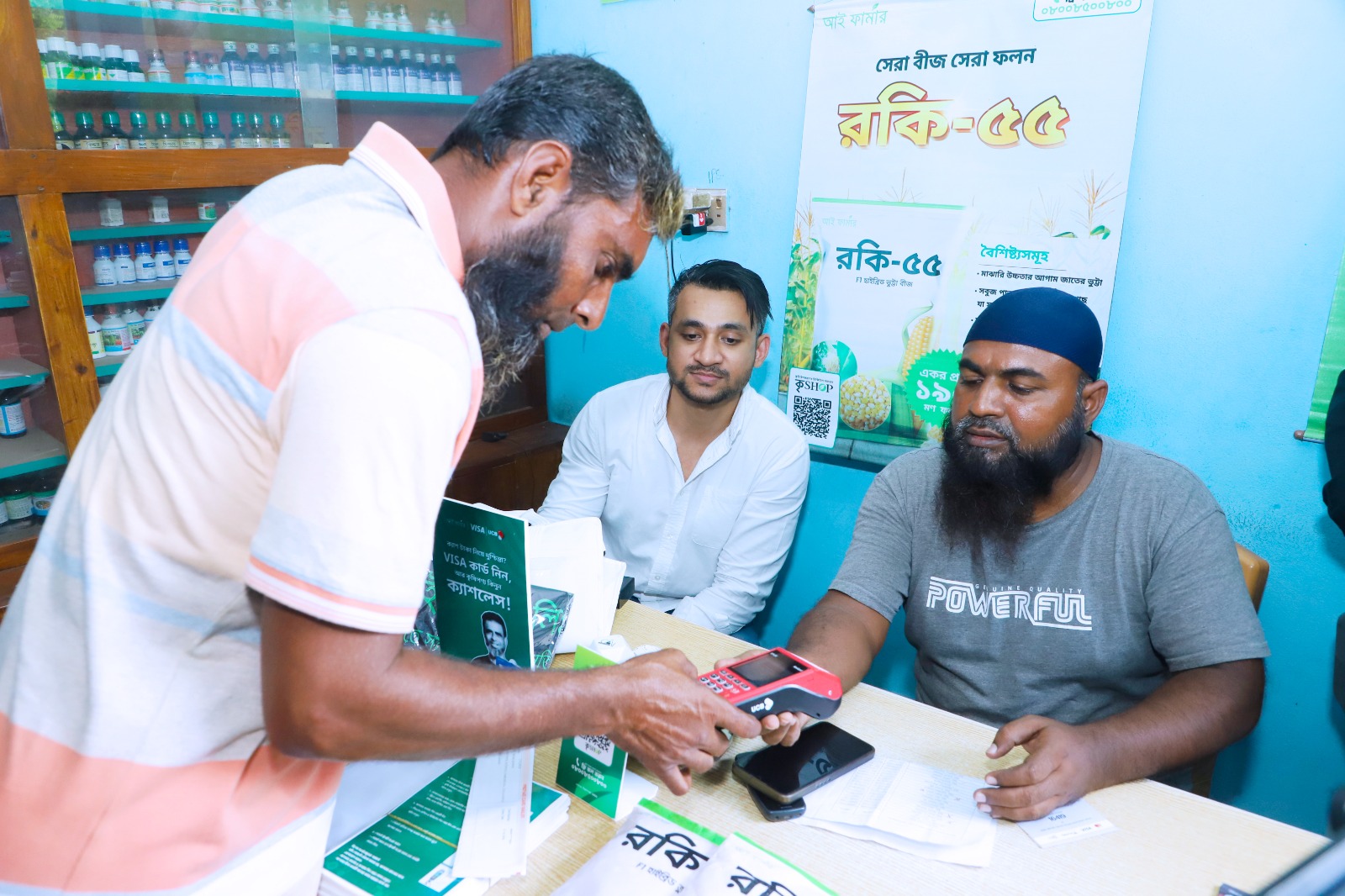
iFarmer is a fascinating company. It works with farmers, solves several complex problems in agriculture, and has built what is now called a “full-stack agri-tech platform,” covering almost every aspect of agriculture. We have written about some of these in the past here. However, one aspect that we have not written about is how iFramer has quietly been transforming the institutional lending landscape in agriculture.
Over the last several years, iFarmer has been working with a growing number of banks and NBFI to help them successfully lend to smallholder farmers across Bangladesh, enabling farmers to access formal institutional financing and financial institutions to explore a highly potential large market that they failed to serve before properly. In the process, iFarmer is transforming the agriculture financing landscape in Bangladesh. iFarmer started by enabling retail investors to invest in farm assets. While it always wanted to work with traditional financial institutions, it was a domain with its complexities and challenges. Naturally, convincing financial institutions to lend to smallholder farmers was not easy in the early years. However, through consistent efforts, the company has managed to make an impact that is slowly but surely changing the overall access to finance landscape for farmers in Bangladesh.
In this article, we provide an insider's perspective on the evolution of iFarmer's partnership with banks and NBFIs to provide financing for farmers in Bangladesh, how iFarmer overcame initial skepticism from banks, explain how iFarmer has become a trusted facilitator between banks and farmers as well as iFarmer's future aspirations to further expand the financial inclusion of farmers.
iFarmer was founded in 2018 as a side project by Fahad Ifaz and Jamil Akbar. The company's initial business model aimed to create a platform where people could lease their houses or factory rooftops for farming. While this "Uber for Urban Farming" concept seemed promising at first, after six months of operation, the iFarmer team realized that the model wouldn’t work.
iFarmer co-founder and CEO Fahad Ifaz previously worked in agriculture, particularly with farmers and agriculture value chain actors. He had an understanding of the major challenges in the agricultural sector. Drawing on his experience, Ifaz and his team decided to pivot to a model that intersected agriculture, finance, and supply chain. They started with tackling the access to finance problems that plague the smallholder farmers across Bangladesh.
They introduced a model where retail investors would invest in agriculture projects/assets. It involved offering farm assets as investment opportunities for retail investors, onboarding farmers who could absorb these investments, and collecting and leveraging data to provide additional services and improve the agricultural supply chain.
iFarmer soon made “Democratizing agriculture financing and supply chain” as one of its core ambitions. The thesis was simple: all over Bangladesh, farmers routinely struggle to access finance, markets, quality inputs, and information. iFarmer decided to address these challenges faced by smallholder farmers.
However, as iFarmer grew and the number of farmers it worked with grew, the company soon realized that to effectively address the financing gap in the agriculture sector it needed a hybrid model where it could combine retail and institutional financing for farmers, reducing dependency on single funding sources while lowering the overall cost of capital.
Now this was a complex problem back in 2020 and it still is. While almost all banks wanted to lend in agriculture and there exist meaningful policy initiatives in favor of that, the prevailing market structure makes it difficult for traditional financial institutions to do so. In most instances, farmers lack the necessary documents required for bank loans and banks lack the necessary infrastructure to verify farmers and manage an agriculture lending operation.
iFarmer has been working on addressing this challenge since the beginning of its journey. “At the core of iFarmer is data,” explained Fahad Ifaz in an interview with FS. “We collect almost 40 data points from each farmer to understand the risk factors, their socio-economic behavior and most importantly farming outcomes... We are also building the tech and business model to support the big players such as banks and NBFIs to be able to finance different actors in the agriculture value chain.”
In 2020, iFarmer started a conversation with financial institutions such as banks and NBFIs to lend to farmers within its ecosystem. The initial reaction was steep skepticism. But it didn’t deter the company. Instead, the iFarmer team has kept at it, and over the last five years, iFarmer has helped a transformation by successfully bridging the critical gap between traditional banking institutions and smallholder farmers.
Before exploring how iFarmer transformed this landscape, let’s take a brief look at the broader context of agricultural financing in Bangladesh.
The agricultural financing landscape in Bangladesh is a complex ecosystem. Traditional agricultural financing faces numerous structural challenges that have historically limited its effectiveness. Perhaps the most significant barrier is documentation: a significant percentage of farmers lack proper documents, making it nearly impossible for them to access formal banking services. This documentation gap, combined with complex collateral requirements and limited credit histories among rural farmers, has created a substantial financing gap in the agricultural sector.
Distribution presents another formidable challenge. With bank branches present mostly in urban and semi-urban areas, financial institutions often struggle to reach farmers. The high operational costs associated with maintaining rural branches have made it difficult for traditional financial institutions to serve farmers effectively. These operational challenges are further compounded by the inherent risks in agricultural lending, including weather-dependent yields, price volatility, and so on.
The regulatory environment in Bangladesh has attempted to address these challenges through various policy initiatives, such as Bangladesh Bank's mandatory agricultural lending targets for banks, which is further supported by interest rate caps and priority sector lending guidelines. Despite these efforts, access to finance remains a key challenge for farmers in Bangladesh.
It was within this complex landscape that iFarmer began its journey to convince financial institutions to finance its farmer partners. The company's first step was to address the deep-seated skepticism of traditional banking institutions.
iFarmer wanted to address this financing challenge when it launched in 2018 with a model to empower retail investors to invest in farm projects, allowing farmers to access finance through an alternative model. By 2020, that model has proven successful. However, the company felt that to make a dent in the large financing gap in the sector, it needed to bring traditional financial institutions to lend to farmers.
Thus, iFarmer started approaching banks in late 2020. The initial reaction was a lot of skepticism. Banks were hesitant to partner with a young startup and were skeptical about iFarmer's ability to gather accurate data from farmers, ensure proper KYC compliance, and manage loans effectively. Banks also grappled with limited infrastructure to reach rural farmers effectively.
iFarmer addressed these concerns by establishing a robust data collection process, utilizing the Porichoy database for verification, and providing transparency through its Sofol app. This allowed banks to monitor loan activities and assess the reliability of farmer data.
The breakthrough came in 2021 when Mutual Trust Bank (MTB) signed an agreement with iFarmer to launch a pilot project, marking a significant step towards bridging the trust gap. The partnership allowed iFarmer to demonstrate its capabilities in collecting and verifying farmer information, ensuring proper KYC compliance, and real-time updates on loan activities, disbursement, project progress, and repayment schedules.
iFarmer’s Sofol app provides real-time updates on loan activities, disbursement, project progress, and repayment schedules. This transparency builds trust between farmers, iFarmer, and the banks involved.
The buyback guarantee from iFarmer provides farmers with a secure market for their produce, mitigating the risk of market fluctuations and ensuring income for loan repayment. This, in turn, assures banks of timely loan recovery.
Farmers benefit from access to formal financial services with significantly lower interest rates (4%) compared to informal lenders. This reduces their financial burden and increases profitability.
Digital processes streamline the loan process, eliminating paperwork and branch visits. This saves time and resources for banks, making the process more efficient and cost-effective.
More importantly, partnering with iFarmer allows banks to reach previously inaccessible rural markets and expand their customer base. iFarmer handles the logistical challenges of reaching farmers, verifying data, and monitoring loan progress, minimizing risks for banks.
The pilot with MTB became hugely successful with nearly 100% timely repayment, paving the way for collaborations with more financial institutions.
Following the successful partnership with MTB, iFarmer gradually expanded its banking partnership to include prominent institutions such as BRAC Bank, Dhaka Bank, Prime Bank, UCB, EBL, IDLC, and Shahjalal Islami Bank. Each partnership adds more power to the ecosystem, with some banks specializing in specific areas such as machinery financing or insurance services.
iFarmer's success lies in its comprehensive approach to agricultural financing. The company has developed a sophisticated digital ecosystem that addresses the pain points of both banks and farmers. More importantly, by the time iFarmer started working with banks, it had already done significant work in enabling retail investors to invest in farm assets. The company already had the platform and processes in place.
In the entire process, iFarmer’s role extends far beyond mere facilitation. The company connects farmers and banks and ensures smooth loan processing and monitoring. The process begins with the bank setting a target number of farmers to finance a specific project. iFarmer then identifies and gathers the required information from farmers in their network.
After verification, the bank directly disburses the loan to the farmer. iFarmer continues to provide support throughout the loan period, offering advisory services and monitoring farmer progress.
This monitoring ensures project success and timely loan repayments. iFarmer also offers product buyback options to farmers through its supply chain network.
This comprehensive approach has resulted in successful project completions and timely loan repayments, further strengthening banks' confidence in the model.

The impact on farmers has been profound. Through iFarmer's platform, farmers now access bank loans with interest rates as low as 4%, a dramatic improvement from the exorbitant rates charged by informal lenders. Overall, it has increased access to finance for more farmers.
This access to affordable credit has freed many farmers from exploitative lending practices and provided them with the financial leverage needed to improve their agricultural operations.
Moreover, iFarmer's initiative has brought farmers into the formal financial system, often for the first time. The opening of bank accounts and introduction to digital financial services have expanded their financial capabilities and opened doors to additional banking services.
iFarmer provides banks with valuable support by helping them extend their reach to smallholder farmers across Bangladesh, a segment traditionally difficult to reach.
iFarmer handles farmer identification, KYC verification, loan processing, and ongoing monitoring, minimizing the burden on banks.
The "Sofol" app offers transparency, allowing banks to track loan utilization and farmer progress in real time.
All in all, iFarmer's partnership model offers banks several key advantages:
Over the last several years, iFarmer has become a crucial player in the agricultural financing landscape in Bangladesh. By expanding bank partnerships, bridging the gap between retail investors, banks, and farmers, and developing targeted financial products such as recently launched visa cards, iFarmer is creating a more accessible and inclusive agricultural finance ecosystem.
However, as iFarmer solidifies its position as an important player in Bangladesh's agricultural financing landscape, several key challenges and opportunities will shape its future trajectory, including geographic expansion, robust technical infrastructure, expansion of financial products beyond basic loans, navigating the regulatory and compliance environment, and further market development.
The success of iFarmer's model has demonstrated the viability of tech-enabled agricultural financing, but the path forward requires a careful balance of growth, innovation, and sustainability. By focusing on these key areas while maintaining its core commitment to farmer welfare, iFarmer is well-positioned to create a lasting impact in Bangladesh's agricultural sector and potentially serve as a model for other emerging markets.
The company's ability to execute these initiatives while maintaining its current service quality will be crucial. Success will require continued innovation, strong partnerships, and a continuous understanding of both farmer needs and market dynamics.
